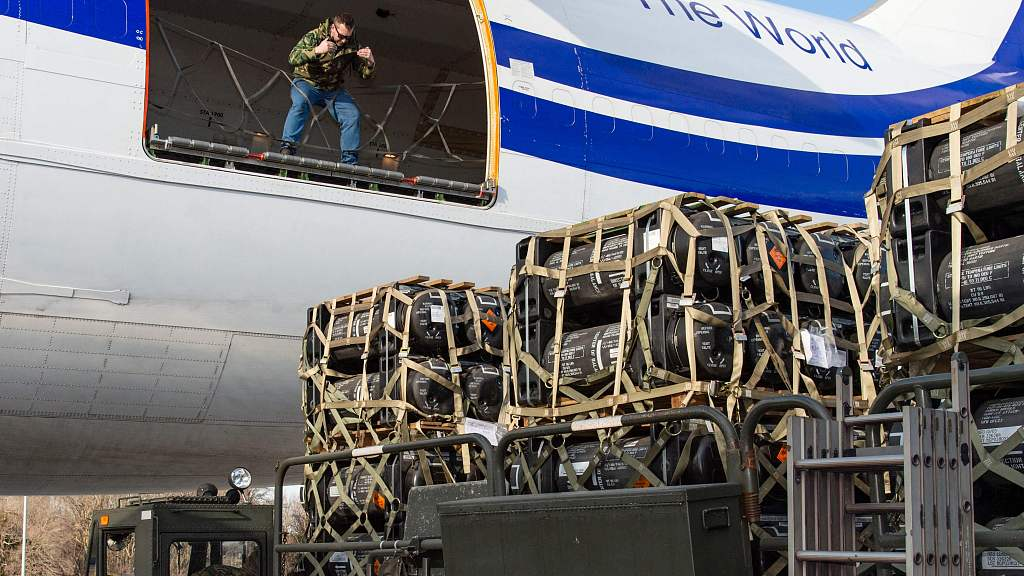
Cargo is loaded on an aircraft during a foreign military sales mission with Ukraine at Dover Air Force Base, Delaware, the U.S., February 10, 2022. /VCG
Cargo is loaded on an aircraft during a foreign military sales mission with Ukraine at Dover Air Force Base, Delaware, the U.S., February 10, 2022. /VCG
Editor's note: Nikola Mikovic is a freelance journalist based in Serbia. He covers mostly Russian, Ukrainian and Belarusian foreign policy issues and writes for multiple web magazines. The article reflects the author's opinions, and not necessarily those of CGTN.
Since Russia launched its "special military operation" in Ukraine on February 24, Russian and Ukrainian representatives have held three rounds of peace talks. However, no major breakthrough has been achieved. Conflict in the eastern European country rages on, and neither Kyiv nor the Kremlin seems to be ready to make any significant compromises.
On March 10 in Antalya, Turkey, Russian Foreign Minister Sergei Lavrov and Ukrainian Foreign Minister Dmytro Kuleba reportedly discussed a ceasefire, but no deal has been made. The major winner of the Russia-Ukraine talks was their host, given that Ankara managed to portray itself as a mediator in the conflict. Indeed, Turkey is so far successfully balancing ties with Moscow and its relations with Ukraine. Turkey has supported Ukrainian territorial integrity but has not joined anti-Russian sanctions imposed by the United States and its allies.
It is entirely possible that future high-level meetings between Russian and Ukrainian officials will take place in Turkey, although chances for the two parties to reach a deal are rather slim.
"There is no instance of a nation benefiting from prolonged warfare," the ancient Chinese military strategist Sun Tzu wrote in his book, The Art of War, almost 2,500 years ago. At this point, however, there are no signals that the conflict in Ukraine will end any time soon. A long military operation will put both Moscow and Kyiv in a very difficult situation.
"My impression is that Russia is not in a position at this point to establish a ceasefire," said Kuleba, holding the point that the Kremlin seeks "a surrender from Ukraine."
"That is not what they're going to get," he concluded.

Trucks delivering ammunition, weapons and other equipment bound for Ukraine as part of a foreign military sales mission at Dover Air Force Base, Delaware, U.S., January 21, 2022. /VCG
Trucks delivering ammunition, weapons and other equipment bound for Ukraine as part of a foreign military sales mission at Dover Air Force Base, Delaware, U.S., January 21, 2022. /VCG
However, Russia is less likely to want a long military operation. Sanctions that the West imposed on the Russian Federation are expected to have an extremely negative impact on the country's economy. Still, as Sun Tzu also said, "In the midst of chaos, there is also opportunity."
"We will overcome adversity, and we will do everything to no longer depend on the West in any strategic sectors of our life that are of decisive importance for our people," Lavrov stressed following his meeting with Kuleba.
Indeed, Russia now has a unique opportunity to completely transform its economic system. The problem is that it is a long-term process and, at this point, it is highly uncertain if the Russian population is ready for such a huge sacrifice. For many people in Russia, "de-coupling" from the West will be a very painful process with an unpredictable outcome.
For Moscow, if it backs down, the West will interpret such a move as a defeat. On the other hand, continuation of the military operation in Ukraine means additional expenses for the sanctions-hit Russian budget as well as huge military casualties. Another problem for the Kremlin is that the United States does not seem to be ready to back down.
Washington and its allies will continue supplying Ukraine with weapons for as long as it takes. Although anti-Russian sanctions imposed by the West will backfire and make a serious impact on Western economies, policy makers in the U.S. are likely counting on such measures to largely influence the situation in Moscow. But even such a scenario does not necessarily guarantee that Russia will fundamentally change its foreign policy.
For the foreseeable future, Russian and Ukrainian officials are expected to continue holding talks in various places, although it is highly improbable that they will reach a compromise any time soon. The very nature of the conflict suggests that it can end only if one of the parties involved agrees to de facto capitulate. And we are still far from such a development.
(If you want to contribute and have specific expertise, please contact us at opinions@cgtn.com. Follow @thouse_opinions on Twitter to discover the latest commentaries in the CGTN Opinion Section.)

